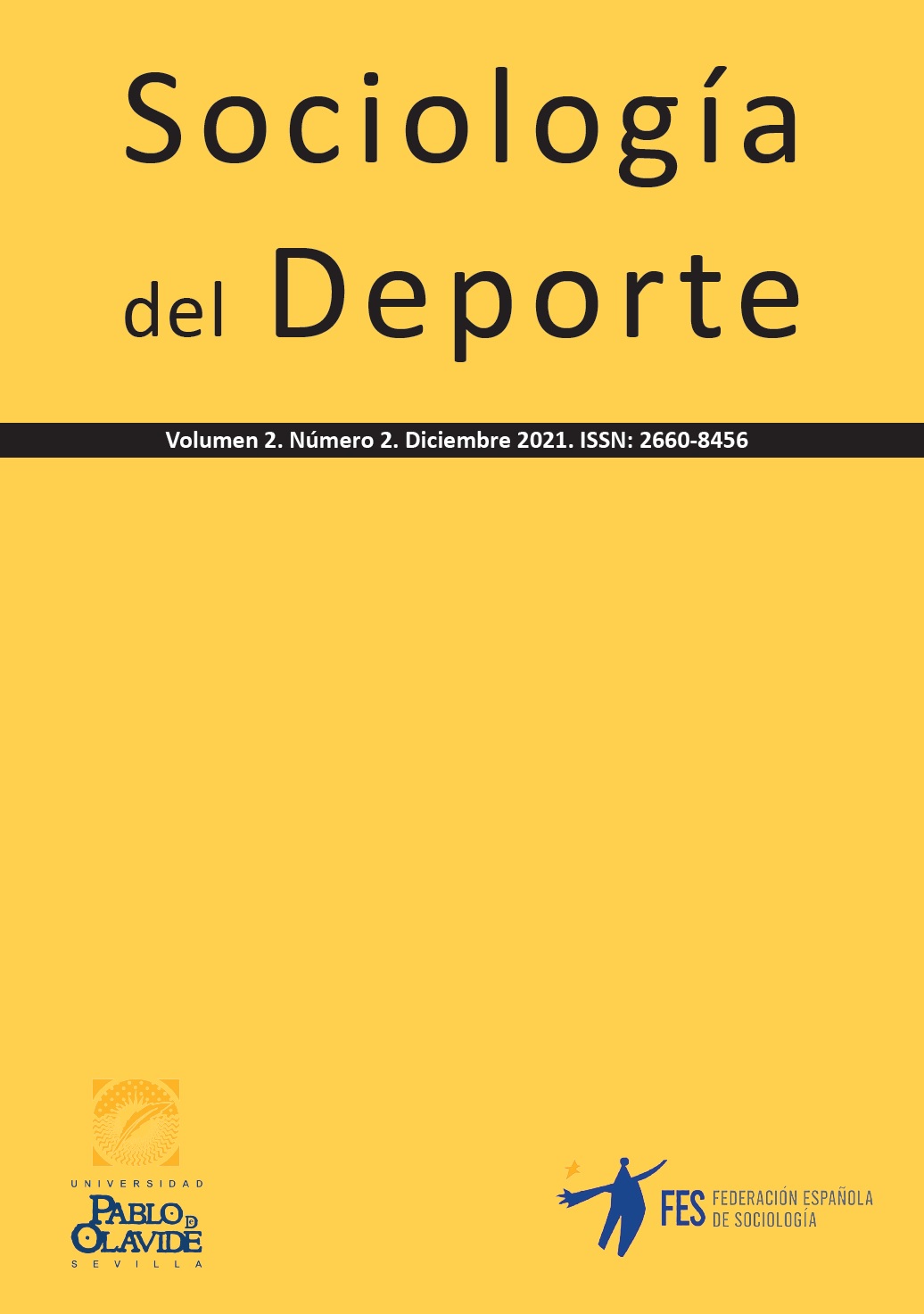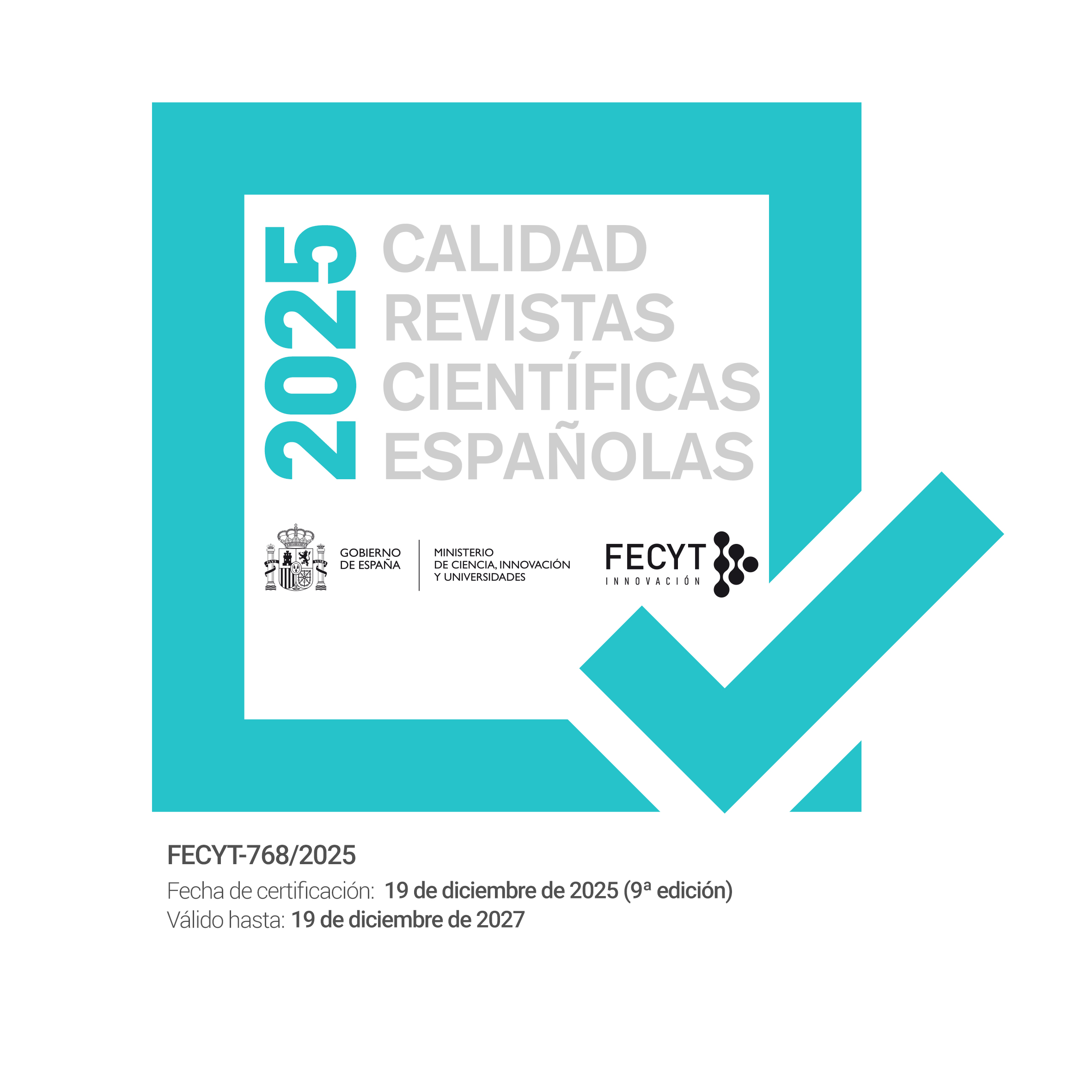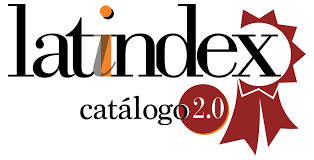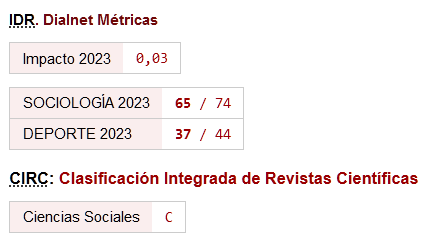Mobilising sociology of sport for social change beyond the pandemic
DOI:
https://doi.org/10.46661/socioldeporte.6378Keywords:
Action research, Inclusion, Play, Public sociology, Social change, Sport of developmentAbstract
Amid the Covid-19 pandemic, conversations about how to build sport back better are becoming increasingly pronounced. The crisis both deepens inequities and creates opportunity as a new way to configure sport post-pandemic demands to be discovered. The challenge has been thrown down to sociologists to help reimagine and reshape the course of sport. What might such re-enchantment look like? And how might it help realise the sociology of sport’s untapped potential to advance impactful public sociology? This paper explores these questions with a particular focus on sociologists of sport as co-creators of, and actors in, social change. I discuss five issues that I see as being relevant for rethinking and reconfiguring sport beyond the pandemic: (1) reclaiming the ludic and pleasure; (2) rethinking sociality in sport; (3) social inequities and ‘sport for all’; (4) de-/re-centring power in sport for development; and (5) global interdependence and interconnectedness. The insights presented can hopefully make a modest contribution to our collective understanding of transformative practice in and through the sociology of sport in uncertain times.
Downloads
References
Bairner, Alan. 2009. “Sport, intellectuals and public sociology: Obstacles and opportunities.”
International Review for the Sociology of Sport 44 (2-3): 115-130.
Bhattacharya, Debapriya, and Fareha R. Islam. 2020. “The COVID-19 Scourge: How affected
are the Least Developed Countries?” OECD Development Matters, 23 April. Available from https://oecd-development-matters.org/2020/04/23/the-covid-19-scourge-how-affected-are-the-least-developed countries/ (accessed 8 February 2021).
Bhattacharya, Debapriya, and Sarah S. Khan. 2020. “COVID-19: A game changer for the
Global South and international co-operation?” OECD Development Matters, 2 September. Available from https://oecd-development-matters.org/2020/09/02/covid-19-a-game-changer-for-the-global-south-and international-co-operation/ (accessed 8 February 2021).
Boykoff, Jules. 2014. Celebration capitalism and the Olympic games. New York: Routledge.
Brown, Adrienne M. 2019. Pleasure Activism: The Politics of Feeling Good. Chicago: AK
Press.
Burawoy, Michael. 2017. “Foreword.” In Achieving social impact: Sociology in the public
sphere, edited by Marta Soler-Galart (pp. v-vii). Heidelberg: Springer.
Burawoy, Michael. 2005. “For public sociology.” American Sociological Review 70 (1): 4-28.
Burnett, Cora. 2015. “Assessing the sociology of sport: On sport for development and peace.”
International Review for the Sociology of Sport, 50(4), 385-390.
Clawson, Dan, Robert Zussman, Joya Misra, Naomi Gerstel, Randall Stokes, and Douglas L.
Anderton, eds. 2007. Public sociology: Fifteen eminent sociologists debate politics and the profession in the twenty-first century. Berkeley, CA: University of California Press.
Cohen, Joshua. 2021. “Austria locks down most of the unvaccinated, unleashing heated
discussions across Europe about how to tackle the latest Covid-19 surge.” Forbes, 15 November. Available from https://www.forbes.com/sites/joshuacohen/2021/11/15/austria-locks-down-most-of-the-unvaccinated-unleashing-heated-discussions-across-europe-about-how-to-tackle-the-latest-covid-19-surge/?sh=acf4e164315e (accessed 22 November 2021).
Collins, Michael, with Tess Kay. 2014. Sport and social exclusion, 2nd edition. London:
Routledge.
Collins, Randall. 2016. “Micro-sociology of sport: Interaction rituals of solidarity, emotional
energy, and emotional domination.” European Journal for Sport and Society 13 (3): 197-207.
Collins, Randall. 2011. “Interaction rituals and the new electronic media.” The Sociological
Eye, 25 January. Available from http://sociological-eye.blogspot.com/2011/01/interaction-rituals-and-new-electronic.html
Collins, Randall. 2004. Interaction ritual chains. Princeton, NJ: Princeton University Press.
Cottingham, Marci. 2012. “Interaction ritual theory and sports fans: Emotion, symbols, and
solidarity.” Sociology of Sport Journal 29: 168-185.
Cray, Kate. 2020. “How the coronavirus is influencing children’s play.” The Atlantic, 2 April.
Available from https://www.theatlantic.com/family/archive/2020/04/coronavirus-tag-and-other-games-kids-play-during-a-pandemic/609253/ (accessed 22 November 2021).
Darnell, Simon. 2012. Sport for development and peace: A critical sociology. London:
Bloomsbury Academic.
De Klerk, Josien. 2020. “Touch in the new ‘1.5-metre society’.” Social Anthropology/
Anthropologie Sociale 28 (2): 255-257.
Delaney, Kevin, and Rick Eckstein. 2003a. Public dollars, private stadiums: The battle over
building sports stadiums. New Brunswick, NJ: Rutgers University Press.
Delaney, Kevin, and Rick Eckstein. 2003b. “The devil is in the details: Neutralizing critical
studies of publicly subsidized stadiums.” Critical Sociology 29 (2): 189-210.
Donnelly, Peter, Simon Darnell, and Bruce Kidd. 2020. The implications of COVID-19 for
community sport and sport for development. Toronto: Centre for Sport Policy Studies, University of Toronto.
Elias, Norbert, and John L. Scotson. 1965. The established and the outsiders. London: Frank
Cass.
Evans, Adam, Joanna Blackwell, Paddy Dolan, Josef Fahlén, Remco Hoekman, Verena Lenneis, Gareth McNarry, Maureen Smith, and Laura Wilcock. 2020. “Sport in the face of the COVID-19 pandemic: towards an agenda for research in the sociology of sport.” European Journal for Sport and Society 17 (2): 85-95.
Fleming, Steve. 2020. “Lessons in survival from the sport for development sector.” sportanddev.org, 29 September.
Available from https://www.sportanddev.org/en/article/news/lessons-survival-sport-development-sector (accessed on 8 February 2021).
Flyvbjerg, Bent. 2001. Making social science matter: Why social inquiry fails and how it can succeed again. Cambridge: Cambridge University Press.
Foucault, Michel. 2008. The birth of biopolitics: Lectures at the Collège de France, 1978– 1979. Basingstoke: Palgrave Macmillan.
Foucault, Michel. 1974. The archaeology of knowledge. London: Tavistock.
Fullagar, Simone. 2020. “Recovery and regeneration in community sport.” Medium, 6 May.
Available from https://medium.com/the-machinery-of-government/recovery-and-regeneration-in-community-sport-9a217bd70aef
Giulianotti, Richard, Hans Hognestad, and Ramón Spaaij. 2016. “Sport for development and peace:
Power, politics and patronage.” Journal of Global Sport Management 1 (3/4): 129-141.
Gray, Peter. 2013. Free to learn: Why unleashing the instinct of play will make our children
happier, more self-reliant, and better students for life. New York: Basic Books.
Grubben, Malou, and Remco Hoekman. 2021. Sociale ongelijkheid in sportdeelname. Utrecht:
Mulier Instituut.
Hafner, Marco, Erez Yerushalmi, Clement Fays, Eliane Dufresne, and Christian Van Stolk.
COVID-19 and the cost of vaccine nationalism. Cambridge: RAND Europe.
Hammersley, Martyn. 2013. The myth of research-based policy and practice. London: Sage.
Huish, Robert. 2011. Punching above its weight: Cuba’s use of sport for South–South co-
operation. Third World Quarterly 32 (3): 417-433.
Huizinga, Johan. 1949. Homo ludens: A study of the play-element of culture. London:
Routledge.
Jeanes, Ruth, Ramón Spaaij, Dawn Penney, and Justen O’Connor. 2019. “Managing informal
sport participation: Tensions and opportunities.” International Journal of Sport Policy and Politics 11 (1): 79-95.
Koopmans, Berber, and Doidge, Mark. In press. “‘They play together, they laugh together’:
Sport, play and fun in refugee sport projects.” Sport in Society.
Lee, Raymond. 2010. “Weber, re-enchantment and social futures.” Time & Society 19 (2): 180-
Lindsey, Iain, and Gareth Wiltshire. 2021. “Sport-for-development and transformative social
change: The potential of Margaret Archer’s morphogenetic approach to reconceptualise a longstanding problem.” Sociology of Sport Journal. https://doi.org/10.1123/ssj.2020-0112
Lindsey, Iain, and Alan Gratton. 2012. An “international movement”? Decentring sport-for-
development within Zambian communities. International Journal of Sport Policy and Politics 4(1): 91-110.
Meade, Michael. 2020. “The power of imagination.” Living Myth Podcast 175, 13 May.
Available from https://www.mosaicvoices.org/episode-175-the-power-of-imagination
Nuki, Paul, et al. 2021. “Fears of ‘vaccine apartheid’ as countries mull immunisation
passports.” The Telegraph, 18 January. Available from https://www.telegraph.co.uk/global-health/science-and-disease/fears-vaccine-apartheid-countries-mull-immunisation-passports/ (accessed 22 November 2021).
Pape, Madeleine, and Fiona McLachlan. 2020. “Gendering the coronavirus pandemic: Toward
a framework of interdependence for sport.” International Journal of Sport Communication 13 (3): 391-398.
Pringle, Richard, Robert E. Rinehart and Jayne Caudwell. 2015. Sport and the social
significance of pleasure. London: Routledge.
Rich, Kyle, Ramón Spaaij, and Laura Misener. 2021. “Theorizing community for sport
management research and practice.” Frontiers in Sports and Active Living 3: 774366. doi: 10.3389/fspor.2021.774366
Rowe, David. 2020. “Subjecting pandemic sport to a sociological procedure.” Journal of
Sociology 56 (4): 704-713.
Sen, Kunal. 2020. “Five ways coronavirus is deepening global inequality.” The Conversation,
August. Available from https://theconversation.com/five-ways-coronavirus-is-deepening-global-inequality-144621 (accessed 4 February 2021).
Schaillée, Hebe, Ramón Spaaij, Ruth Jeanes, and Marc Theeboom. 2019. “Knowledge
translation practices, enablers, and constraints: Bridging the research-practice divide in sport management.” Journal of Sport Management 33 (5): 366-378.
Spaaij, Ramón, and Hebe Schaillée. 2021. “Inside the black box: A micro-sociological analysis
of sport for development.” International Review for the Sociology of Sport 56 (2): 151-169.
Spaaij, Ramón, and Hebe Schaillee. In press. “Collaborative evaluation in sport and leisure.”
In Evaluation in Sport, Leisure and Wellbeing, edited by Kevin Harris and Andrew Adams. London: Routledge.
Spaaij, Ramón, Jonathan Magee, and Ruth Jeanes. 2014. Sport and social exclusion in global
society. London: Routledge.
Spaaij, Ramón, Karen Farquharson, Jonathan Magee, Ruth Jeanes, Dean Lusher, and Sean
Gorman. 2014. “‘A fair game for all? How community sports clubs in Australia deal with diversity. Journal of Sport and Social Issues 38 (4): 346-365.
Spaaij, Ramón, Sarah Oxford, and Ruth Jeanes. 2016. “Transforming communities through
sport? Critical pedagogy and sport for development.” Sport, Education and Society 21 (4): 570-587.
Staley, Kiera. et al. 2021. “Staying safe while staying together: the COVID-19 paradox for
participants returning to community-based sport in Victoria, Australia.” Australian and New Zealand Journal of Public Health. https://doi.org/10.1111/1753-6405.13177
Sterchele, Davide. 2015. “De-sportizing physical activity: From sport-for-development to
play-for-development.” European Journal for Sport and Society 12 (1): 97-120.
Stiglitz, Joseph. 2020. “Conquering the great divide.” Finance & Development: A Quarterly
Publication of the International Monetary Fund 57 (3): 17-19.
Tankwanchi, Akhenaten S., Brett Bowman, Michelle Garrison, Heidi Larson, and Charles S.
Wiysonge. 2021. “Vaccine hesitancy in migrant communities: a rapid review of latest evidence.” Current Opinion in Immunology 71: 62-68.
Tranow, Ulf. 2020. “Digital Rituals: Can Collins' Interaction Ritual Chain Theory be applied
online?” ResearchGate, 11 May. Available from https://www.researchgate.net/post/Digital_Rituals_Can_Collins_Interaction_Ritual_Chain_Theory_be_applied_online
Webster, Christopher. In press. “The (in)significance of footballing pleasures in the lives of
forced migrant men.” Sport in Society.
Zirin, Dave. 2008. “Calling sports sociology off the bench.” Contexts 7 (3): 28-31.

Published
How to Cite
Issue
Section
License
Copyright (c) 2022 Ramon Spaaij

This work is licensed under a Creative Commons Attribution-NonCommercial-ShareAlike 4.0 International License.









